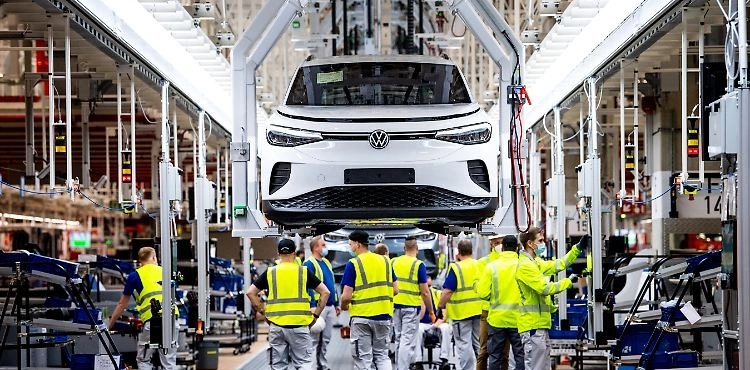The automotive industry is central to value creation, employment, and innovation in Germany.
As Europe’s and the world’s automotive hub, this sector supports around 2.2 million jobs, accounting for seven per cent, according to the Federal Ministry for Economic Affairs and Climate Action (BMWK).
Thus, this industry constitutes an indispensable backbone for employment in Germany, which, according to Ludwig Storch, Business Developer at EAAZE, “is the country of automobile manufacturers.”

In this context, he tells Mobility Portal Europe: “The migration to electric mobility is much more difficult here than in other countries, as many sectors of the economy also depend on the automotive sector.”
This means that the transition involves not only changing car technology but also transforming entire areas and a shift in mindset.
In June, new registrations of battery electric vehicles (BEVs) decreased by 18,1 per cent, with 43.412 units.
The proportion of BEVs in total registrations reached 14,6 per cent.
Since the beginning of the year, 184.125 new purely eCar sales have been recorded, and by the end of June, this market was 16,4 per cent below the registration level of the first six months of 2023.
In light of this situation, the Vice President of the Central Association of the German Automotive Industry (ZDK), Thomas Peckruhn, stated: “The growth in new vehicle registrations continues to be driven by petrol and diesel vehicles.”

“Most customers opt for these cars due to ongoing uncertainty and skepticism surrounding electric mobility,” he explains.
He maintains that “it is feared that there will probably be no change in the trend of BEV registrations this year.”
It is noteworthy that ZDK brings together more than 36,000 vehicle dealers and workshops in Germany.
As a consequence, several brands have reduced or delayed their eVehicle production targets, including Mercedes Benz, whose plan to manufacture only BEVs from 2028 has been discarded.
“We need greater consensus, which is not currently on the horizon, to provide new impetus to the transition,” emphasises Ludwig Storch.
Undoubtedly, the cancellation of subsidies in the EV sector, implemented as a cost-reduction measure, has negatively impacted the growth rate of electromobility.
Nevertheless, in light of various political factors, especially regarding the deployment of charging infrastructure, the discussion on eMobility is expected to resurface.
Especially with the recent announcement of the 2025 budget, which could include support for this industry.
“In principle, the government could resume subsidies here if possible,” notes the EAAZE representative.
According to him, electric mobility “is a marathon race,” for which aid is important, especially considering that a “great capacity for endurance is needed to survive economically.”
Although it is common for registrations to decrease in the first months of the year, the sector is concerned that this trend has not yet shown signs of growth.
In this context, car manufacturers have much to lose, particularly regarding their market position and job stability.
For this reason, they also oppose the European Union’s proposal to impose tariffs on Chinese vehicle producers, as this could adversely affect their operations in that Asian country.
Moreover, this is already having consequences.
According to Bloomberg, the shares of companies such as Volkswagen Group, Mercedes-Benz AG, and BMW AG fell by more than two per cent in early trading this year.
Thus, anti-subsidy measures could harm the competitiveness of the German industry, resulting in a loss of market share in China, the world’s largest market, in a potential trade war.

In this context, both the German Association of the Automotive Industry (VDA) and the executives of BMW and Mercedes-Benz have expressed their discontent with this investigation.
“The EU’s anti-subsidy measures will not solve the challenges facing the German and European automotive industry,” said Hildegard Mueller, President of the VDA.
The potential trade conflict triggered by the investigation could jeopardise employment in the country, which partly depends on business with the Asian giant.








